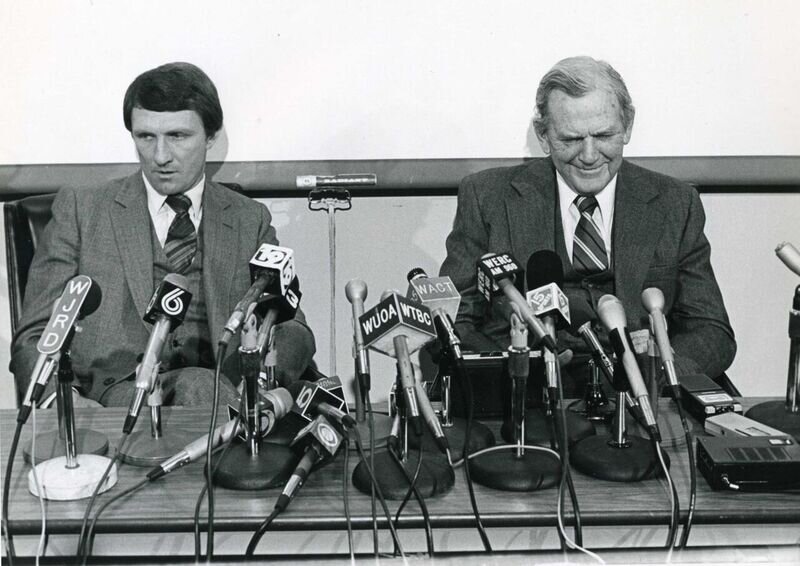Former Bama coach Perkins remembered as innovator of offense
By TIM GAYLE
Ray Perkins, an innovative offensive coordinator who was better known as the coach who followed Paul “Bear” Bryant, died in his sleep at his Northport home on Wednesday morning. He was 79.
“Ray Perkins was a great friend and an outstanding football coach who served the University of Alabama with true class and integrity,” Alabama coach Nick Saban said. “Coach Perkins was a great leader who had a tremendous impact on the game of football at all levels. Our thoughts and prayers go out to his wife, Lisa, and his children Tony, Mike, Rachael and Shelby.”
Perkins earned All-America honors as an Alabama receiver, earned a Super Bowl ring as a player with the Baltimore Colts and was the last person at Alabama to serve in a dual role as both head football coach and athletic director. But more than that, he’ll always be remembered as the guy who followed Bryant as the Crimson Tide football coach.
Bryant reportedly said he wanted Gene Stallings in that role, perhaps because he didn’t think Perkins would leave his position as head coach of the New York Giants or because Perkins’ gruff demeanor with the media after being in the Big Apple wouldn’t translate to a Southern college position.
Bryant was right. Perkins’ blunt, often confrontational style put him at odds with Alabama fans and Crimson Tide media during his tenure from 1983-86, but that attitude was just what was needed after 25 years under Bryant.
Perkins would later issue the famous edict that Alabama “will never play Auburn in Auburn” and a lot of people correctly praise Pat Dye for making it happen in 1989, but many also forget that Perkins had left Alabama after the 1986 season.
Just as Alabama hired him away from a promising future with the Giants, Perkins was hired away by Hugh Culverhouse after the 1986 season to coach the Tampa Bay Buccaneers. Years later, Perkins would observe that he was waiting for Alabama to make a counteroffer, but Crimson Tide administrators stood silently by after Culverhouse extended an offer to rejoin the professional ranks.
Perkins, a native of Petal, Miss., was one of the nation’s finest receivers for quarterbacks Joe Namath, Steve Sloan and Ken Stabler in 1964-66. He was on national championship teams in 1964 and 1965 and an undefeated team in 1966. His performance in the 1965 Iron Bowl, where he had three receptions for 84 yards and a touchdown, was crucial to the Tide’s success. Late in the game, he was playing defensive back in a prevent defense when he recorded Alabama’s school-record seventh interception.
He played five years for the Colts, catching passes from legendary quarterback Johnny Unitas, before electing to get into coaching.
After a year as an assistant at Mississippi State, he jumped into the professional ranks as a receivers coach with the Patriots (1974-77) and as the Chargers’ offensive coordinator (1978) before the Giants hired as their head coach.
He built the team by hiring great assistants such as Bill Parcells, Bill Belichick and Romeo Crennel, then walked away when Bryant announced his retirement and Alabama officials reached out to Perkins to take over as coach and athletic director.
“Ray was George Young’s first hire as general manager in 1979,” Giants co-owner John Mara said in a statement to the New York Daily News on Wednesday. “I remember George saying, ‘He will make it very uncomfortable for our players to lose.’ Ray did a good job for us and got us into the playoffs in 1981 for the first time in many years.
“During the 1982 season, which was shortened due to a players’ strike, he announced he was leaving at the end of the year to go to Alabama, which he described as his dream job. He left behind a team that had Lawrence Taylor, Phil Simms and Harry Carson, among others and this was the nucleus of the group that would go on to great success in the 1980s and win two Super Bowls. I always wondered whether he later regretted that decision. But he certainly left our team in much better shape than he found it in, including having Bill Parcells and Bill Belichick on his staff.”
He did not win a title in his eight years as head coach of the Giants and Tampa Bay Buccaneers (1987-90), but his friend and Giants defensive coordinator Parcells gratefully inherited Perkins’ team and reached the pinnacle twice.
“I loved Ray and he was a very close friend of mine,” Parcells told the Giants Wednesday. “I was very saddened by the news. He’s the only reason I was in pro football; he’s the one who brought me into the league. He was my friend. I worked for him at the Giants and then he worked for me at the Patriots. He was a great guy.”
In six short weeks, he showed his ability as a collegiate coach by landing 26 recruits from all walks of life that included Ensley’s Cornelius Bennett, Gardendale’s Curt Jarvis, Stanhope Elmore’s Andrew Gilder, Gordo’s Wayne Davis, Williamson’s Greg Richardson, Fairhope’s Randy Rockwell, Hazlewood’s Kerry Goode, Marvin Humphries of Jeff Davis and Mike Shula of Miami, Fla.
Goode paid homage to his college coach on his Facebook page Wednesday.
“Growing up in a town smaller than his hometown of Petal, Miss., he once told me, ‘I’m not supposed to be here and I’m sure you’re not. You’re town is much smaller than the one I grew up in… Prove them wrong. Everyone in that locker room bleeds like you and you watch them put their pants on. I’m counting on you to be a big part of what we do.’ Coach Perkins’ belief in this little skinny kid from Town Creek helped me realize that I could compete with the best. Coach, ‘that guy from Town Creek’ as you would call me, is forever grateful and indebted to you. Thank you for allowing me to be the first in a long line of athletes for Town Creek. I know we were not supposed to be here but you saw things differently.”
It was Perkins’ knack. He wouldn’t get everything right and he often rubbed people the wrong way, but after going 8-4 in 1983 and 5-6 in 1984, he turned the Tide’s fortunes with the help of that first recruiting class, going 9-2-1 in 1985 and 10-3 in 1986.
“Coach Perkins was more than a coach. He was a great man who taught me how to become a leader,” Bennett tweeted on Wednesday. “Things he said to me during our weekly 1/1 meeting still help me to this day. He cared for and loved me like a father. I’ll truly miss him. God bless his/my family!”
After a stint with Tampa Bay (1987-90), Perkins went back to college for one year at Arkansas State, then spent the last eight years of his coaching career in the professional ranks as an assistant. He returned briefly to coaching in 2012-13 with Jones County Junior College, but retired to Hattiesburg, Miss., then moved to Northport when his daughter Rachael started college at Alabama in 2016.
Current New York Giants coach Joe Judge, who served as a special teams analyst under Saban at Alabama in 2009-11, crossed paths with Perkins and talked with the former head coach about a variety of issues.
“Coach was a guy who touched a lot of lives in the National Football League as well as college football,” Judge told the Daily News. “There are a lot of relationships around this country with him. Personally, I’ve had some crossover with Coach through his time coming through Tuscaloosa when I was down there, as well as some contact early in my tenure here. But I appreciate everything he did for me, the time he shared with me, and our thoughts and prayers go out to his family.”
In addition to coaching ties in the NFL, several assistants at Alabama went on to become head coaches, including Rockey Felker (Mississippi State), Dave Radar (Tulsa), Jim Fuller (Jacksonville State), Mike DuBose (Alabama) and Sylvester Croom (Mississippi State). Former assistant Steve Hale later became the president of the Senior Bowl and former players Mike Shula (Alabama) and Willard Scissum (Morehouse) were among those who landed head coaching jobs as well.
Perkins was inducted into the Alabama Sports Hall of Fame in 1990 and the Mississippi Sports Hall of Fame in 1998. In 2019, he was selected to represent Alabama in the Southeastern Conference Championship Game as one of the conference’s 14 “legends.”
“We are deeply saddened to hear of the passing of Coach Perkins,” Alabama athletic director Greg Byrne said, the seventh AD to follow Perkins in that role. “Just a year ago we were celebrating him as our ‘SEC Football Legend’ in Atlanta, an honor he was truly deserving of. Coach Perkins served in every possible capacity of Alabama athletics as an All-American football player, head coach and athletics director and he will certainly be missed. Our thoughts and prayers are with his wife, Lisa, and children Tony, Mike, Rachael and Shelby, extended family and friends during this time.”



